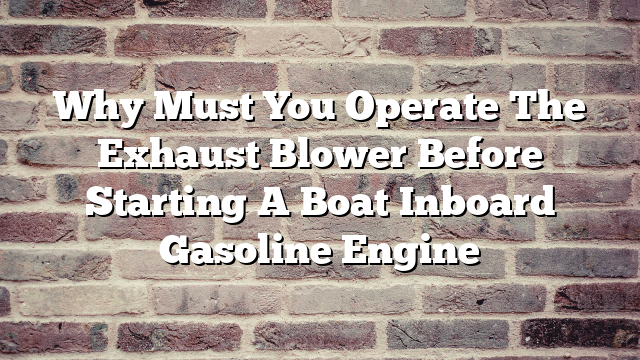Introduction:
Operating the exhaust blower before starting a boat’s inboard gasoline engine is a critical step that should never be overlooked. Whether you are a seasoned sailor or a novice boater, understanding the importance of this simple yet crucial task is essential for the safety and performance of your vessel. In this article, we will explore the reasons behind this practice and shed light on why every boat owner should make it a habit to operate the exhaust blower before starting their engine.
Paragraph 1:
Picture this scenario: you’re ready to embark on a day of adventure out on the water, the sun is shining, and the waves are calling your name. As you prepare to start your boat’s inboard gasoline engine, you may be tempted to skip the step of operating the exhaust blower, thinking it’s unnecessary or time-consuming. However, this seemingly minor action serves a vital purpose – it prevents a potentially catastrophic event known as a gasoline vapor explosion.
Gasoline vapor, being highly volatile and flammable, can accumulate in the bilge or engine compartment of a boat. Even a small spark or electrical arc can trigger an explosion with devastating consequences. The exhaust blower, when activated, serves to remove these dangerous fumes by venting them out of the boat, thereby reducing the risk of an explosion. By taking a few extra moments to operate the blower before starting your engine, you are ensuring the safety of yourself, your passengers, and your beloved vessel.
Operating the exhaust blower before starting a boat’s inboard gasoline engine is crucial for safety. It helps remove any accumulated fuel vapors and prevents the risk of explosions. By running the blower for a few minutes, you ensure that the engine compartment is properly ventilated, reducing the chances of fire or other hazardous situations. Remember to always follow manufacturer guidelines for your specific boat model.
Why You Must Operate the Exhaust Blower Before Starting a Boat Inboard Gasoline Engine
Operating the exhaust blower before starting a boat inboard gasoline engine is a crucial step that should never be overlooked. This simple yet important action helps to ensure the safety of both the boat and its occupants. Understanding why this step is necessary can help you prevent potential hazards and keep your boating experience enjoyable.
1. Preventing Carbon Monoxide Buildup
One of the primary reasons for operating the exhaust blower before starting a boat inboard gasoline engine is to prevent carbon monoxide buildup. Carbon monoxide is an odorless and colorless gas that is produced as a byproduct of burning gasoline. It is extremely dangerous and can be fatal if inhaled in high concentrations.
By running the exhaust blower for a few minutes before starting the engine, you can effectively remove any accumulated carbon monoxide from the engine compartment. This helps to create a safer environment for everyone on board by minimizing the risk of carbon monoxide poisoning.
2. Ensuring Proper Ventilation
Another important reason to operate the exhaust blower is to ensure proper ventilation in the engine compartment. When a boat is not in use, the engine compartment can become a closed space with limited airflow. This can lead to the buildup of various gases, including fuel vapors.
By running the exhaust blower, you can help to remove any stagnant air and fuel vapors from the engine compartment. This helps to reduce the risk of explosions or fires that could occur when starting the engine. Proper ventilation is essential for maintaining a safe and functional boat.
3. Meeting Safety Regulations
Operating the exhaust blower is not only a safety precaution but also a requirement under boating safety regulations. Many boating authorities and organizations mandate the use of an exhaust blower before starting the engine to minimize the risk of carbon monoxide poisoning and fuel-related accidents.
By following these regulations and operating the exhaust blower, you demonstrate your commitment to safety and responsible boating. It is essential to familiarize yourself with the specific regulations in your area and always abide by them to ensure a safe and enjoyable boating experience.
4. Protecting the Engine
In addition to safety considerations, operating the exhaust blower can also help protect the boat’s inboard gasoline engine. By removing any accumulated gases and ensuring proper ventilation, you help to prevent potential damage to the engine.
Excessive carbon monoxide buildup can lead to poor engine performance and even engine failure. Fuel vapors, if not properly vented, can also cause corrosion and damage to various engine components. By operating the exhaust blower, you take an important step in safeguarding the longevity and functionality of your boat’s engine.
5. Establishing Good Habits
Finally, operating the exhaust blower before starting the boat’s inboard gasoline engine is a good habit to establish as a responsible boat owner. By making it a routine practice, you ensure that you never forget this essential step, even in hectic or rushed situations.
Consistently operating the exhaust blower demonstrates your commitment to safety and responsible boating practices. It sets a good example for others on board and helps to minimize the risk of accidents or incidents caused by neglecting this important safety measure.
Frequently Asked Questions
Here are some commonly asked questions about why you must operate the exhaust blower before starting a boat inboard gasoline engine.
Question 1: Why is it important to operate the exhaust blower before starting a boat inboard gasoline engine?
Answer: Operating the exhaust blower before starting a boat inboard gasoline engine is crucial for several reasons. Firstly, it helps to remove any built-up fumes or gases that may be present in the engine compartment. Gasoline engines produce potentially hazardous fumes such as carbon monoxide, which can be dangerous if inhaled in high concentrations. By running the exhaust blower, these fumes are expelled from the engine compartment, reducing the risk of carbon monoxide poisoning.
Secondly, the exhaust blower helps to ensure proper ventilation in the engine compartment. Adequate ventilation is important to prevent overheating of the engine and other components. It helps to dissipate heat and maintain a cooler operating environment, which can prolong the life of the engine and prevent potential issues.
Question 2: When should the exhaust blower be operated before starting a boat inboard gasoline engine?
Answer: The exhaust blower should be operated before starting a boat inboard gasoline engine every time the boat has been stationary for an extended period, especially if it has been stored in an enclosed space. This includes situations such as when the boat has been docked overnight or when it has been kept in a covered storage area.
It is important to run the exhaust blower for a sufficient amount of time, typically around 4-5 minutes, to ensure that any accumulated fumes or gases are completely expelled from the engine compartment. This time frame allows for proper ventilation and reduces the risk of potential hazards associated with inhaling or igniting these fumes.
Question 3: Can I skip operating the exhaust blower if I have an open-air engine compartment?
Answer: Even if you have an open-air engine compartment, it is still recommended to operate the exhaust blower before starting a boat inboard gasoline engine. While an open-air compartment may provide some natural ventilation, it may not be sufficient to remove all the fumes or gases that can accumulate in the engine compartment.
By running the exhaust blower, you ensure that any potentially harmful fumes are effectively expelled, reducing the risk of carbon monoxide poisoning and maintaining a cooler operating environment for the engine.
Question 4: What happens if I don’t operate the exhaust blower before starting the engine?
Answer: If you fail to operate the exhaust blower before starting a boat inboard gasoline engine, several risks can arise. Without proper ventilation, fumes and gases can accumulate in the engine compartment, including carbon monoxide. Inhaling carbon monoxide can lead to symptoms such as headache, dizziness, nausea, and even unconsciousness or death in severe cases.
In addition to the health risks, insufficient ventilation can also cause the engine and other components to overheat. Overheating can lead to engine damage, decreased performance, and potential breakdowns. It is essential to prioritize safety and proper maintenance by always operating the exhaust blower before starting the engine.
Question 5: Is there any alternative to using the exhaust blower for proper ventilation?
Answer: While the exhaust blower is the recommended method for ensuring proper ventilation in the boat inboard gasoline engine compartment, there are some alternative measures you can take. One option is to open all hatches and windows on the boat to allow for natural ventilation. This can help to some extent but may not be as effective as using the exhaust blower.
It is important to note that relying solely on natural ventilation may not adequately remove all the fumes and gases from the engine compartment, especially in enclosed or partially enclosed spaces. Therefore, the exhaust blower remains the most reliable and efficient method for proper ventilation and reducing the associated risks.
In conclusion, it is imperative to operate the exhaust blower before starting a boat’s inboard gasoline engine for several important reasons. First and foremost, this precautionary step ensures the safety of both the passengers and the boat itself. By running the exhaust blower, any potentially harmful fumes or gases that may have accumulated in the engine compartment are expelled, reducing the risk of a dangerous and potentially deadly explosion or fire. This simple act of activating the exhaust blower can significantly minimize the chances of a catastrophic accident, providing peace of mind and a safer boating experience for all involved.
Furthermore, operating the exhaust blower before starting the boat’s inboard gasoline engine is not only a matter of safety but also a crucial step in maintaining the engine’s longevity and overall performance. By properly ventilating the engine compartment, the exhaust blower helps prevent the accumulation of moisture, which can lead to corrosion and damage to various engine components. Additionally, running the blower clears any debris or obstructions that may have found their way into the exhaust system, ensuring smooth and efficient operation. By incorporating this simple yet essential practice into your pre-start routine, you can extend the lifespan of your boat’s inboard gasoline engine and enjoy many trouble-free and enjoyable boating adventures in the future.

















